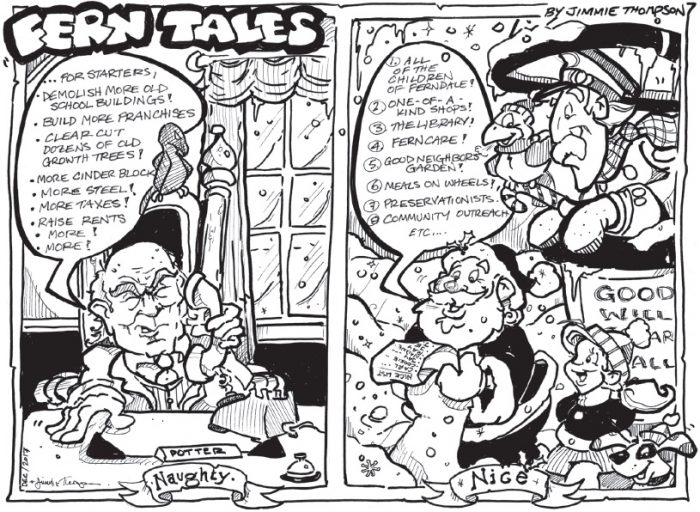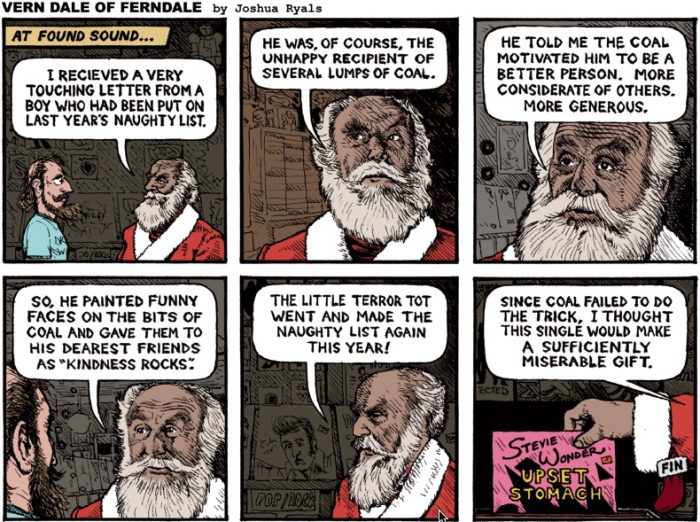By Rebecca Hammond
AUTUMN ODDSERVATION: Americans throw away the most pumpkins the week we buy the most pumpkins. Pumpkins are heavy, and we pool our tax money to put our unwanted stuff in landfills. Can we rethink them already? Maybe eat them? I’ve made pumpkin pies from ones people discard. A pumpkin can be stabbed a few times and roasted till soft, or cut up and boiled, then mashed and made into pies or bread, even soup. A Google search of recipes turns up some as simple and cute as using a small pumpkin for a dip container, and muffins, cupcakes, pumpkin cheesecake, pumpkin turkey chili, spread, dip, coffee additive. Pumpkin is healthy. Full of fiber and potassium, not to mention vitamin C, beta carotene, tryptophan and phytosterols (which studies show may lower “bad” cholesterol): it makes more sense to eat all those health benefits than to load them in a diesel-gulping truck, have them driven miles away, and toss them onto our mountain of discards.
Pumpkins seeds can be roasted and eaten. Scoop out the seeds and wash them. Let them dry. Roast at 325 degrees for 5-15 minutes. Some recipes tell you to toss them in butter or oil, or add seasonings like garlic. Put them in bird feeders if you don’t want to eat them. Our forebears would be amazed at how we turned good food into temporary disposable decorations.
The EPA’s website (which still happens to contain environmental information, something we may not be able to count on for long) states that in the early phases of decomposition, organic matter in landfills decays aerobically, producing little methane. The longer it remains, however, the more anaerobic the process becomes, and the more methane is produced. Methane is a potent greenhouse gas, so preventing its formation is good common sense. Composting at home is the best way. We have a simple worm system in our basement, and being a skeptical person at this age of 60, I do nothing that’s recommended but put all organic waste in the bin with red worms dug from the yard. I’ve had this going for years now, and once or twice a year dig out the good stuff at the bottom and add it to houseplants or garden plants. I do not layer with newspaper, although every article I read says to. The worms know what to do; you can’t stop them from turning pumpkins or old lettuce into fertilizer.
I have in my living room a fern I rescued from the trash one fall years ago. Every year I see more ferns and plantable mums waiting for those diesel trucks. A person could fill a house and yard with the plants thrown away, at group expense, every fall. And you could stock a thrift store with the usable goods we toss.
ACTION ANTIDEPRESSION: An old friend recently told me about her struggle to replace disposable coffee cups in her counseling office with reusable cups. She’s a former seminarian, which reminded me that churches often grapple with the same two extremes, disposable, reusable? Counseling offices and churches are both places of meaning, places people go to to sort out life’s big issues. The issue of tossing vs. keeping might be bigger than being green or saving money. Lots of us love a certain mug for some specific reason. I bought my current favorite at the Henry Ford Museum with a beloved niece and her daughter on our annual January trip. A cup of coffee in that mug is more than warm liquid in a vessel, it’s a daily reminder of love and connection across miles, of a relationship important enough to prioritize. Maybe reusable cups are green, are good common sense, and maybe even a tiny little bulwark against disconnection and the depression and anxiety that we seek counseling to remedy. Quite possibly, disposable items are actually a bit depressing.
IN EARLY NOVEMBER, a big storm battered parts of the Lake Superior shore, with record
waves as high as 28 feet near Munising. A depressing aftermath turned up a few days later, with massive amounts of plastic trash washed along the shore of what we think is our most pristine Lake. Our state government won’t ban plastic bags, and they even took big government a step further and banned the banning of plastic bags. But if you visit most public beaches along the Great Lakes, you’ll see signs banning glass bottles, so it’s not bans themselves that they object to. We seem short-sighted, and have personalized risk, so a broken bottle that may cut us is unacceptable, tons of plastic junk that waves grind down until it disappears to view is fine. Plastic fibers have been detected not only in the Great Lakes, and on beaches, but in tap water, 83 per cent of samples tested world-wide. Wildlife mistakes plastic bits for food, and may fill up on it, with no nutritional benefit, of course. And in oceans, plastic trash is being found in the stomachs of creatures seven miles deep.
Is this depressing information? I don’t think so. I think it’s lack of action that’s depressing, not news itself. The onslaught of bad news has an antidote, taking action against the problem. But, I must admit, it gets harder to rectify the problems the worse we let them get.
LEAF ODDSERVATION: Last week three dump trucks, a bulldozer, and a front-end loader parked in front of our house to pick up leaves; compostable, valuable organic leaves. That maybe tells me more about cultural excess than I ever wanted to know.
Becky Hammond believes in “solvitur ambulando” (“it is solved by walking”), and practices it most days here in Ferndale.

 our upcoming Winter Reading Challenge an opportune time for parents to make sure these young minds are still in gear when the New Year arrives. Reading for recreation when kids are away from school is invaluable. But it’s that much more fun when there’s prizes and programs included!
our upcoming Winter Reading Challenge an opportune time for parents to make sure these young minds are still in gear when the New Year arrives. Reading for recreation when kids are away from school is invaluable. But it’s that much more fun when there’s prizes and programs included!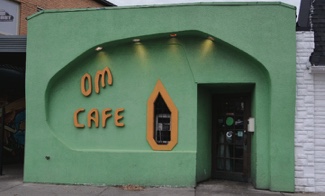
 cozy interior, including a range of beautiful artwork on the walls from local artist, Sumi Lee. Colleen Smiley was the original owner of The Om for over 20 years, and she helped forge a path ahead for those who favor a meat-free diet. While the meatless market is widely accepted as a healthy lifestyle in modern times, public perception was not always so favorable. The emphasis at The Om has been consistently on meatless cuisine, with menu options focusing on homegrown and organic fruits & vegetables, plus GMO-free/pesticide-free grains (macrobiotic and gluten-free menu options included). The Om formerly served fish, but these days the only non-vegan foods served are cheese (with certain dishes), and eggs are available on the brunch menu at least for the near future.
cozy interior, including a range of beautiful artwork on the walls from local artist, Sumi Lee. Colleen Smiley was the original owner of The Om for over 20 years, and she helped forge a path ahead for those who favor a meat-free diet. While the meatless market is widely accepted as a healthy lifestyle in modern times, public perception was not always so favorable. The emphasis at The Om has been consistently on meatless cuisine, with menu options focusing on homegrown and organic fruits & vegetables, plus GMO-free/pesticide-free grains (macrobiotic and gluten-free menu options included). The Om formerly served fish, but these days the only non-vegan foods served are cheese (with certain dishes), and eggs are available on the brunch menu at least for the near future.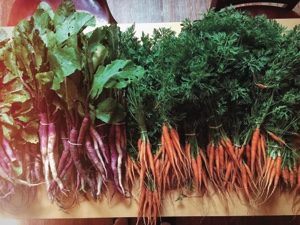 currently handling the majority of the café operations, along with her husband, Matthew Helsel, and a team of 12 other staff. Norwood was introduced to The Om Café at age three, through her mom, and worked her way up over the past five years, from waitressing to management, then into ownership. She fondly describes The Om as, “a child of mine since I was little…I used to empty my piggy bank for a nori roll! This is absolutely my dream job. I can’t imagine being away from this space and this environment.”
currently handling the majority of the café operations, along with her husband, Matthew Helsel, and a team of 12 other staff. Norwood was introduced to The Om Café at age three, through her mom, and worked her way up over the past five years, from waitressing to management, then into ownership. She fondly describes The Om as, “a child of mine since I was little…I used to empty my piggy bank for a nori roll! This is absolutely my dream job. I can’t imagine being away from this space and this environment.”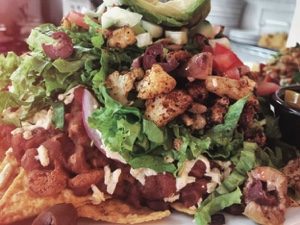 forms of vegan cuisine, and being a chef is generally an egocentric profession. But I continuously learn and grow. Food is life. It’s a gift to enjoy. Every member of staff here plays a pivotal role.”
forms of vegan cuisine, and being a chef is generally an egocentric profession. But I continuously learn and grow. Food is life. It’s a gift to enjoy. Every member of staff here plays a pivotal role.”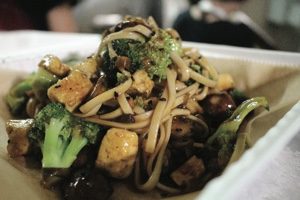 donation box inside the café and the proceeds go to a local shelter. Recently, she hosted a “Nom Week,” where The Om joined forces with the nosh pit food truck, and together they raised money for Ferndale’s Catfe Cat Shelter.
donation box inside the café and the proceeds go to a local shelter. Recently, she hosted a “Nom Week,” where The Om joined forces with the nosh pit food truck, and together they raised money for Ferndale’s Catfe Cat Shelter.
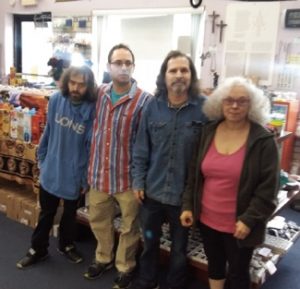 eclectic selection of items, Knight Light is a relaxing treat to browse around. The store is a family-run business, previously situated for two decades in Detroit (at Mt. Elliott & Gratiot). Customers come from all over to shop – including many from out-of-state locations and Canada.
eclectic selection of items, Knight Light is a relaxing treat to browse around. The store is a family-run business, previously situated for two decades in Detroit (at Mt. Elliott & Gratiot). Customers come from all over to shop – including many from out-of-state locations and Canada.